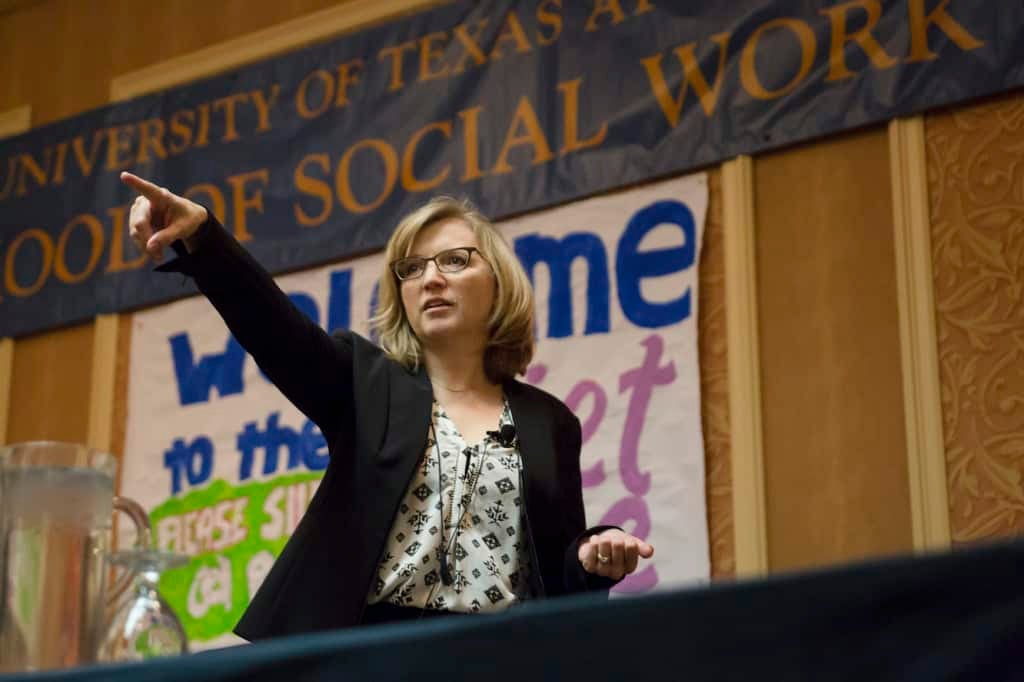
For the past 24 years, the School of Social Work has been convening an annual conference for school-based social service providers from Texas and beyond. Organized by clinical professor Kathy Armenta, this conference provides a space for networking and learning a wide array of techniques and programs to enhance school-based social work and empower students, parents and school personnel.
We spoke with Frances Deviney, one of the keynote speakers of this year’s conference, which took place March 25-27 here in Austin. Deviney is the associate director for research and planning at the Center for Public Policy Priorities, an independent public policy organization that advocates for solutions that enable Texans of all backgrounds to reach their full potential. In her presentation, Deviney used data from the Kids Count Data Center and Better Texas Family Budgets to create a “data story” about how Texas kids and families are doing and what can be done to advocate for positive change. Download the full presentation here (pdf).
Why should people care about childhood data in Texas?
Deviney: I’m going to give you the long answer. For a long time, many of our elected officials were making decisions based on anecdotes, stories, their own personal experience, or that of whoever got to them first or made the strongest argument. It was the best information they had but it was not always necessarily the best information about all children.
Back in the 1980s, the Annie E. Casey Foundation started the Kids Count project, to look at data on how kids were doing in each of the 50 states. They were able to rank states on the basis of information such as birth outcomes, child abuse, graduation rates, health indicators, etc. This initiative was received with such enthusiasm and support, and had such an impact on the way legislators approached creating laws that affected kids, that the foundation decided to bring it from the national to the state level, because so much of what makes an impact on kids happens at the state level. We now have 53 Kids Count organizations across the country. We are one of them, and we do the same that the national group does, but at the state level, for Texas. The goal was to get the best data possible on what is going on with kids in their communities, and to inform state legislators and local leaders so that they can make data-based decisions.

What the data show is that when we make decisions like budget cuts to the education system, there are important effects that we can measure, such as how many kids are there per classroom, the teacher-student ratio, student performance, etc. In short, the data help tell a bigger, broader story of all kids, and not just of the moment but overtime.
What are the main stories the data are telling for Texas Now?
Deviney: One of every four kids in Texas live in poverty. Poverty is the bigger barrier to opportunity for Texas children. Poverty is the best predictor of how children will do in education, their future health, and it is actually something that we can change. Many people feel like poverty is incredibly overwhelming, almost like a natural force that you can’t do anything about. But in fact we as a country have made changes that reduced poverty over time. You can see that with our seniors. We made choices in the first part of last century and then again in the 1960s, when we decided, as a country, that we didn’t want our grandparents to work all their lives and then be in poverty after they retire, we didn’t want them to go without healthcare. We took action: we instituted social security, and we created Medicare. And we saw the poverty rate for seniors go down from one in every three seniors to one in every nine. We did it! We can do it. We just have to make the choice we want to. Poverty is not an insurmountable issue, but it is one of the biggest problems of our time in our state.
The second story is that we need to prioritize kids in our state policies if we want to make change. What does this mean? You can create legislation all day long, but if you don’t back it up with resources to implement it strongly, it does not go anywhere. People make the argument that you should not just throw money at a problem, but in fact, we have been taking money away for years. Texas ranks as the number one state to do business, but as the number 43 to be a kid! And as one of today’s attendees pointed out today, Texas ranks 49 in mental health expenses, we are in the bottom ten when looking at expenses per student in public schools… We really don’t invest in our human infrastructure at a time when we are going to be driving the success of the country, by our sheer numbers alone. The United States added two million children in the last decade, and Texas accounted for half of that growth! We need to prioritize our children, and make sure that they are protected and prepared for the future.
What can school social workers do about this?
School social workers are the frontline fighters for children. They are natural advocates. You would no be a school social worker if you didn’t want to fight for an advocate for children, in your own way. It’s critically important for school social workers to raise their voices with their own stories. Find a story that really compels you, that identifies a problem that you see as systemic in your school, your district, your region; back that story up with data to show that it’s not only about that particular children or family; and share it. Social workers are armed with the most important information that people need to hear, that is, human stories that show what is going on in children’s lives. If they make the decision of raising their voices, schools social workers can be the strongest advocates for our children
By M. Andrea Campetella. Photos by Miguel Gutierrez Jr. Posted March 2, 2015.

